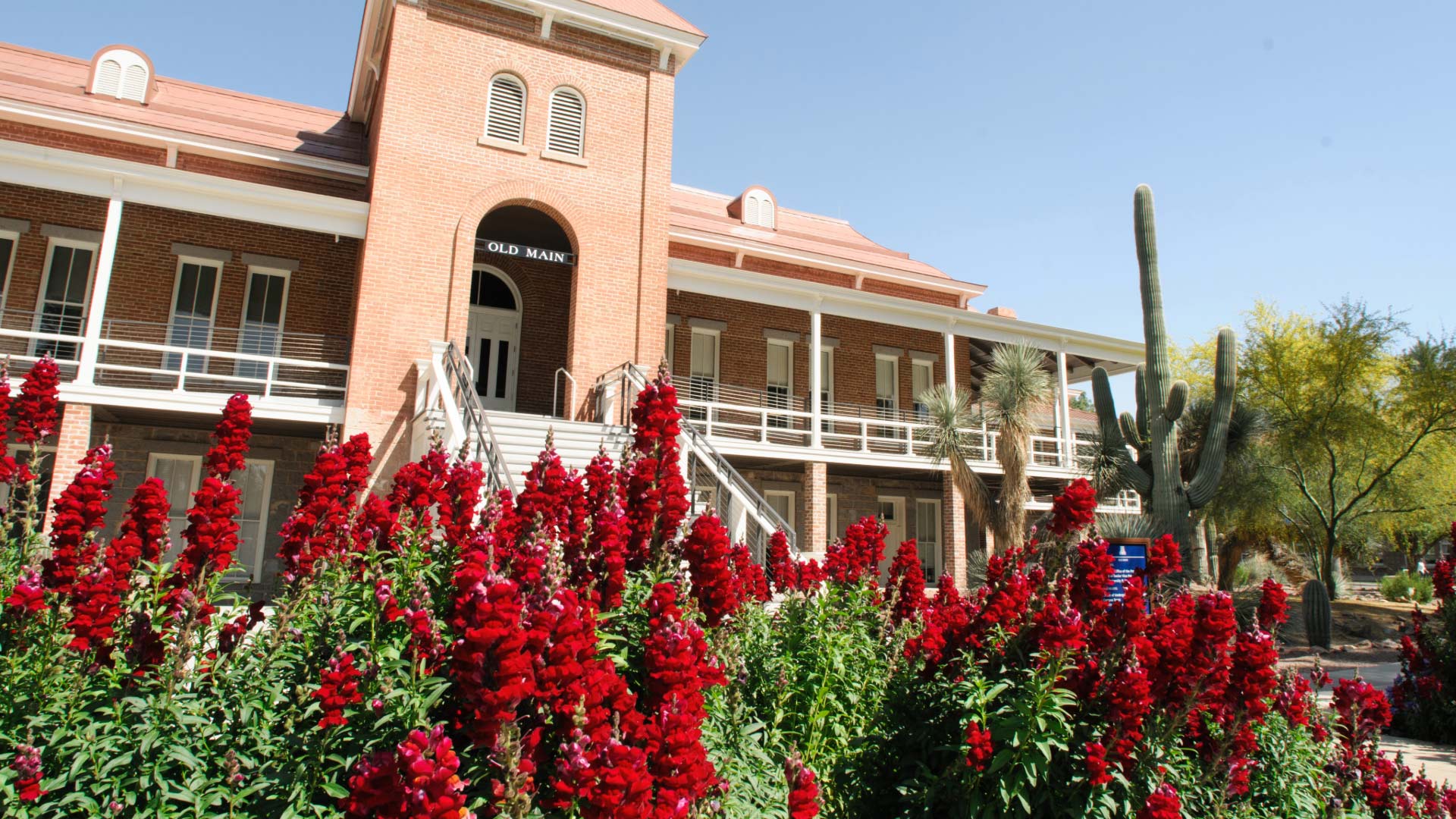 Old Main located at the University of Arizona.
Old Main located at the University of Arizona.
$27 million dollars worth of vacant positions in academic units will be “permanently” eliminated, according to a new report sent to Governor Katie Hobbs on Friday.
Other cuts include eliminating the university’s eSports program to save $300,000, suspending competitive grant programs in the Provost Investment fund to save $1.5 million, delaying the initiation of the President’s Postdoctoral Fellowship Program’s next cohort to save $400,000, and suspending the Strategic Priorities Faculty Initiative, which is expected to save $475,000 per year. The total cost savings of those cuts would be nearly $30 million.
The new report comes two weeks after Hobbs blasted the university and Board of Regents for their response to UA’s fiscal issues.
Hobbs wrote to ABOR Chair Fred DuVal and ABOR Executive Director John Arnold saying, “There is no coherent vision, let alone even an agreement on the severity of the problem, on how to lead the university moving forward.” At the time, she called for an independent, third-party consultant to “avoid this from becoming a case of the ‘fox guarding the henhouse.’” She demanded that the consultant be responsible for proposing a plan of solutions, conduct an external audit, and provide monthly reporting to the Governor’s office and ABOR.
Friday’s report is the first of many to come detailing how the university will work to restore its fiscal reserves. If spending does not slow down, the university is projected to reach a further $177 million deficit.
The report emphasized that the university is “not in imminent financial jeopardy but…is currently operating with a budget shortfall of approximately $177 million and must make significant changes to avoid such danger.”
Immediate actions
Those changes will be aimed at reducing operational costs. That includes restructuring administration, rightsizing college and division budgets, launching a new budget model, modernizing athletics, reviewing the University of Arizona Global Campus, and more. Other avenues the university is also exploring are retirement incentives and ways to enhance revenue.
Arnold’s investigation found that UA’s financial challenges are actually due to a number of issues like: Decentralized budget and operation models Lower-than-expected revenues “Investment in strategic priorities that were successful but costly” Increasing costs in athletics External factors (e.g., COVID-19, inflation) Revenues not keeping pace with tuition discounting
The new report reiterated much of what Arnold and UA President Robert Robbins announced last week to campus stakeholders with a few new additions, including deadlines, projected cost savings from cuts and more.
Human resources and information technology is expected to complete centralization by March 4, while university advancement, facilities, marketing and communication is expected to be “consolidated” or “reviewed” by June 30.
13 positions have already been identified for elimination or reclassification. However, the positions were not named. The university has emphasized that it is reviewing all vice president, vice provost, and vice dean positions.
“Over the coming months, positions will be affirmed, reclassified, and/or eliminated, as necessary,” the report said.
The university will also continue its pause on its salary increase program through fiscal year 2025.
Conflict of Interest
The board acknowledged Hobbs’ fears of conflicts of interest, in regard to John Arnold serving in two capacities–as UA’s interim Chief Financial Officer and as ABOR’s Executive Director.
When her letter was first published, Hobbs said that the financial crisis “damaged ABOR’s credibility in their oversight functions” and therefore must have a “greater separation between the Board and the university to restore the trust of [her] office and the public.”
The board agreed that Arnold’s interim role should not remain permanently.
“The University of Arizona will need a permanent Chief Financial Officer, and the University and the Board are moving in that direction as quickly as appropriate,” the report said.
They went on to reassure the governor that they are “in final negotiations with a global professional services firm to provide third-party advice and evaluation of the University’s financial information and decision-making, particularly around the areas of athletics and the online education experience (e.g., UAGC).”
UAGC and Athletics
The letter and report did not address Hobbs’ primary concern over the University of Arizona Global Campus. Instead, the report detailed that the board is working to finalize negotiations with a global professional services firm to review UAGC and all of UA’s financial information and efficiencies related to online activities.
Athletics is also in the final steps in partnering with an external partner to modernize Athletics from the ground up, including a budget reset and installing hard caps on spending
“Athletics took the first step in addressing revenues by announcing new ticket pricing structures,” the report said.
Transparency
ABOR and university leadership write that they are addressing the financial action plan “through an interactive, transparent process.” According to the report, university leadership has engaged with the Faculty Senate, the Committee of Eleven, the Strategic Planning and Advisory Budget Committee, Heads Up, Staff Council, and student governments.
The board has also assigned a Regent to work with senior administrators daily and is committed to providing the Governor’s Office with monthly reports.
However, optimistic sentiments regarding UA’s and ABOR’s transparency may not be shared by all. Both the Faculty Senate and Staff Council are reviewing no confidence votes in ABOR and UA leadership. Earlier this week, Faculty Senate Chair Dr. Leila Hudson called the engagement that she has seen as “tone-deaf mansplaining.” Staff Council Chair Melanie Madden said she did not find out about the changes until it was announced to campus stakeholders late January.
“What I would really love to see is that level of consultation where shared governance really has a seat at the table,” Madden told AZPM.
The Arizona Board of Regents holds the broadcast licenses for AZPM.

By submitting your comments, you hereby give AZPM the right to post your comments and potentially use them in any other form of media operated by this institution.